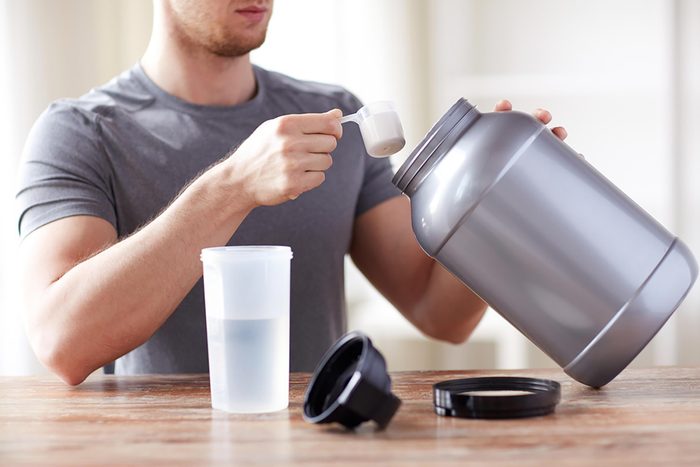Be honest with your doctor
Fibbing to your doctor is a lose-lose situation. If they don’t know all the facts, it makes it harder for them to give you the best care—also, you can trust your doctor to keep your secrets thanks to a little legal precedent known as doctor-patient confidentiality. Here are the things people should never lie to their doctor about—and why.

Your surgical history
When you first see a new doctor because you switched health care providers or moved to a new town, you’ll be filling out lots of medical and insurance forms. A biggie in the long list of “yes” and “no” checkboxes refers to your surgical history from minor procedures to major operations. Manhattan plastic surgeon David Shafer, MD, says being honest about your past will help alleviate complications in your future. Every surgeon needs background info to minimize the risk for scar tissue, reactions, and more. “I always find it concerning when a patient tells me they have never had surgery, and when I examine them, they have what are clearly face-lift incisions,” he says.

Your age
As you begin to approach middle age, start menopause, or feel the aches and pains of getting older, you might be tempted to tell a little white lie about your age. While it’s likely not a big deal to fudge the truth to a bartender, coworker, or blind date, your doctor needs to know the truth about everything, including how many candles were on your last birthday cake. Not only is your age a crucial in determining treatment, but it’s information they’re going to find out eventually. “I know patients don’t like admitting their age, but it’s very important to be truthful,” Dr. Shafer says. “If a patient tells me they are 49 but then their insurance card shows a birthday indicating they are 57, I have to wonder if the patient is lying about anything else.”

What you eat
If you’re trying unsuccessfully to lose weight but aren’t being truthful about your habits, your doctor won’t be able to help much. “Studies have shown that patients underestimate how much they are eating and how often they indulge in unhealthy food. Many patients don’t want to admit the difficulties they have with complying with the prescribed diet, so it is easier for them to deny that they are eating anything ‘bad,'” says Tania Dempsey, MD, an integrative doctor in Armonk, New York.
Instead of feeling ashamed of giving in to cravings or not exercising, explain what’s tripping you up so your doctor can offer advice. “If I think that the diet intervention isn’t working as expected, first I am going to question why, and then I might have to resort to more aggressive treatment options,” Dr. Dempsey says. “If patients admit to their indiscretions, then doctors can work with the patient to develop strategies to keep their diet on track.”

How you’re using medications
When you can’t shake a cough or you’re experiencing an abnormal breakout, a doctor’s job is to diagnose you and prescribe the right treatment. However, if you go back complaining that you’re still not feeling better, be honest when your doctor asks how often you took the pills or how you applied the cream. “If you are not truthful about whether you are actually using your medications, then we cannot accurately gauge if they are or are not working for you,” explains Manhattan dermatologist Joshua Zeichner, MD.
He explains that when patients come back for their follow-up appointment, he quizzes them about how they have been using a topical medication. “It may come out that they used them for a week and gave up, are only spot treating and not applying to the full face as directed, or didn’t even fill the prescription at all.”

Your smoking habits
You might tell friends and family you only smoke socially, even when you’re really blowing through a pack a day. Every doctor—from a cardiologist to a dermatologist—will recommend you stop the dangerous habit. You might be tempted to lie about your smoking, but Andrew J. Miller, MD, a plastic surgeon in Manhattan, says to come clean.
“One of the biggest habits that patients are often not truthful about is smoking,” he says. “Nicotine is very detrimental to healing, and many surgeons will not perform certain surgeries because the incision may break down, causing significant scarring after a long healing process. Sometimes the patient has lied about smoking just to get the procedure done, but in the end, they are just hurting themselves.” (Need help? Here are 22 ways to quit smoking.)

The supplements you take
Your doc wants to help you stay healthy and happy. Dr. Dempsey says that sometimes patients are embarrassed to admit that they are taking vitamins, supplements, or herbs because they’re afraid their doctor might scold them for believing in natural remedies. But doctors need to understand what you’re taking to make sure there are no interactions.
“The truth is that many doctors believe that vitamins are important for patients with vitamin deficiencies. Unfortunately, there can be interactions between certain vitamins or herbs and prescription medication,” she says. “These interactions could lead to higher or lower levels of the medication they are taking, which could greatly impact their health. It is crucial for patients to be upfront about everything they are taking.”

Using recreational drugs
“There is growing drug use in this country, and doctors are being kept in the dark by their patients,” says Dr. Dempsey. “Patients don’t want to admit to their drug use because they don’t want that information to become part of their medical record. They fear that it could affect their insurance policy or their employment.”
She stresses that being able to properly diagnose and treat you relies on a complete picture of your health and vices. For example, if you smoke marijuana semi-frequently, you might have trouble with focus and memory or you might feel depressed or moody. When your doctor sees this and knows you’re a recreational user, then they may attribute those reactions to your habit. If you don’t tell them? You could end up with a prescription you don’t need.

If you’ve had an abortion
As a private choice and experience, an abortion isn’t the easiest of topics to discuss, even with your doctor. However, if you want to one day have a family or you’re now trying to get pregnant, reproductive specialist Jane Frederick, MD, says your doctor needs to know your full medical history, including if you’ve had an abortion.
“There can be scar tissue and damage to the uterus. We want to make sure that we have a good uterine cavity before we implant any embryos during IVF,” she explains. “Knowledge of an abortion will help us properly evaluate the uterus, offer a proper medication protocol, and take extra steps to make sure the uterus is ready for implantation.”

How you’re really feeling—mentally
Be straight with how you’re really feeling with your doctor. If you’re feeling “blah”—tell them. Kind of depressed, sometimes, maybe? Say that. Anxious and not sure what to do about it? Be open.
“No matter what, aim to share these feelings with your doctor if you feel unhappy or ‘stuck,'” says Michael Alper, MD, a fertility specialist in Boston. “We understand the emotions you may be feeling. By speaking your mind and being honest, no matter how imperfect you may feel, it helps you to feel better. And it helps us. An honest dialogue frees your mind when speaking with a doctor. It will do wonders for helping you to process information in a clear manner, recall questions you may have previously had, and give you a renewed sense of confidence and control.”

Your sexual history
How many partners you’ve had, when you last had sex, if it was unprotected, and if you’ve had an STD. All of these are pretty private questions, but they’re also ones that are important for doctors to know, says Jaime M. Knopman, MD, director of fertility preservation at CCRM-NY and co-founder of Truly, MD. Doctors won’t judge you; they’re trying to help.
“We just want to know so that we can keep you safe and educate you on safe sex practice. If we don’t know what you are doing and who you are doing it with, we can’t test you for the appropriate conditions or come up with the best way to keep your reproductive organs healthy,” she explains.

When you last went to the doctor
You haven’t had a teeth cleaning in years. You have never been to an eye doctor. You might have a rotten track record of keeping up with medical appointments, but your doctor doesn’t care. In fact, they’re just glad you’re there now, ready for a checkup. Instead of skirting the truth about the last time you sought care, be up-front so your doctor can treat you accurately. “If you are new to a physician, we don’t know what happened and how frequently it happened in the past,” Dr. Knopman says. “Routine screening keeps you safe. Don’t lie about when you went to the doctor last and what they did or did not check. It won’t help us know how best to take care of you in the future.”

That you’re nervous
Even if you don’t have iatrophobia—the fear of a going to a doctor—it’s common to feel nervous when you’re sick. If you’re Googling your symptoms, you might be expecting the worst. It can help to be honest about the fact that you’re scared. “Oftentimes, anxiety shows itself by being mean or rude to staff or doctors. We are here to help you and are very used to helping people get through dental treatment,” explains Nancy E. Gill, a dentist in Golden, Colorado. “We would love to give you options to ease your anxiety or nerves, but it helps if we know.”

How much time you spend in the sun
Even on the coolest day of winter or when it’s overcast and raining, dermatologists recommend wearing sunscreen or other forms of sun protection to shield your pores from harmful, dangerous rays. So when your doctor asks about how much time you’re spending outdoors, they want to understand your hobbies, habits, and how much sun damage risk you’re exposing yourself to.
“Most people do not realize that they get sun exposure on a daily basis going in and out of their car, or going to get mail, as well as when they are active outside whether for work or play,” explains Purvisha Patel, MD, a dermatologist in Germantown, Tennessee. “Skin cancer is caused by the sun, so getting patients to be compliant with sun protection is important, and understanding their lives helps tailor their prevention techniques.”

How much you drink
“How many drinks do you have a week?” The answer might vary, but your doctor is trying to understand your habits. This is especially essential if you ever need surgery, as too much alcohol can cause permanent damage to your liver, according to neurosurgeon David Poulad, MD, a member of the neurology group IGEA Brain and Spine and on staff at Overlook Hospital in Summit, New Jersey.
“Alcohol abuse can also cause patients to go through withdrawal during a hospitalization,” he explains. “Alcohol withdrawal can manifest with seizures and needs to be recognized in order to be treated appropriately. If we know about a history of alcohol abuse, we can treat a patient prophylactically to avoid this possible complication.” Make sure you’re not drinking alcohol before a cholesterol test or doing any of these 10 other things you should never do before a doctor’s appointment.

